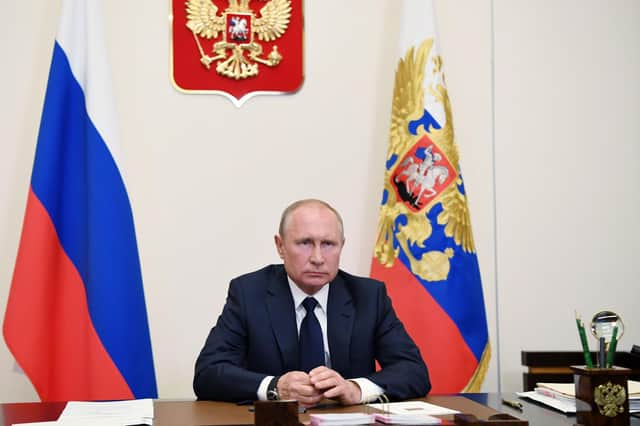Gas price crisis: With Russia's Vladimir Putin in control of the valve, importing supplies was always high risk – Brian Wilson


Beneath the marketing pitches, it is the same gas and electricity, no matter how it is packaged, sold or mis-sold, as has often been the case. The “competition” element was always largely phony though an industry developed around it.
As we are seeing, the “competition” did not depend on product or service but on who was most efficient at hedging bets where clear advantage lay with the big guys with the deepest pockets.
Advertisement
Hide AdAdvertisement
Hide AdSo now we will be back to a handful of suppliers. The gospel of “switching” to save will not only be of dubious benefit but also impossible because nobody will be volunteering to take on new customers at existing rates, far less lower ones. Such is the genius of the market.
Regulation, which was meant to protect consumers from the predations of privatised companies, has really done no such thing. From its inception, Ofgem was obsessed with the theory of a competitive market when what consumers really need is the certainty of a fair price.
While government now has to find sticking-plasters, it might also see an opportunity to review energy policy in a non-ideological way. Even larger numbers will be unable to heat their homes this winter while whole industries are threatened by the price of a commodity on which existing policy has bet the house – ie imported gas.
How did we get into this mess and how do we get out it? The first answer goes back to privatisation of the energy industries, the ideology that flowed from it and the effective sub-contracting of policy to the said market-obsessed regulator and powerful commercial forces, the two often intertwined through a shared commitment to short-termism and illusions of competitive markets.
From that perspective, the flow of apparently unlimited gas was always the answer. No politician boasted: “It is my government’s policy to make Britain’s energy needs reliant on imported gas.” It was sexier to talk about renewables or, for some, closing down the nuclear industry which they hated far more than they cared about cutting emissions.
But the largely unspoken truth was that neither could have happened without assuming gas would always always be available – both to provide baseload when the wind doesn’t blow and replace the void created by the nuclear run-down. Replacing carbon-free nuclear with fossil fuel gas was, of course, an environmental folly but the Greens didn’t care.
To make matters worse, the UK ceased to be an exporter of gas 20 years ago and now imports two-thirds of our requirements. Not that it came cheaper because we produced it ourselves but at least that did help the security of supply factor.
An argument against gas over-reliance which one might think would have appealed to recent governments was the power it gives Russia, which has unlimited supplies of the stuff and knows how to use it strategically. Why bother to march into Europe with snow on their boots when the turn of a valve can cause such chaos?
Advertisement
Hide AdAdvertisement
Hide AdA few days ago, wind generated three per cent of UK electricity. As I write, it is 34 per cent. It does not take Einstein to work out that something is needed to hedge against that gap. Nuclear is down to 16 per cent and so gas is pitching in 30 per cent which can rise to 50 per cent.
What about Scotland? All the stuff about producing “120 per cent” of our needs from renewables (albeit by importing foreign hardware) has been entirely dependent on the scale of the UK-wide market, UK-wide subsidy and (thanks to the nuclear run-down) UK-wide baseload via interconnectors.
Facts, chiels, winna’ ding. At UK and Scottish levels, we need a realistic appraisal of how to achieve the holy grail of secure supply, affordability and net-zero targets. How timely to be reminded that all of these are threatened by reliance on imported gas.
Maybe Mr Putin has been having some pre-Cop26 fun with that valve.
A message from the Editor:
Thank you for reading this article. We're more reliant on your support than ever as the shift in consumer habits brought about by coronavirus impacts our advertisers.
If you haven't already, please consider supporting our trusted, fact-checked journalism by taking out a digital subscription.
Comments
Want to join the conversation? Please or to comment on this article.
